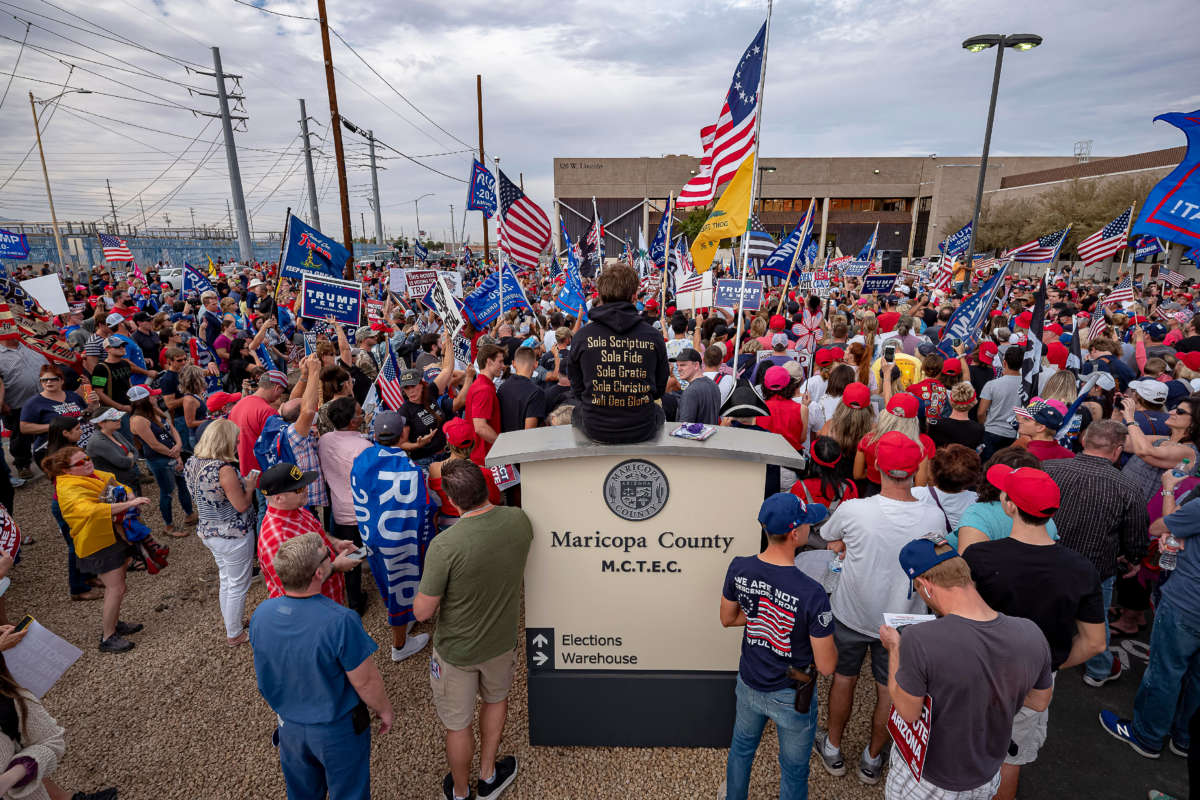Did you know that Truthout is a nonprofit and independently funded by readers like you? If you value what we do, please support our work with a donation.
A judge from the Maricopa County Superior Court of Arizona has ordered the state’s Republican Party and its lawyers to pay over $18,000 in attorney fees that were incurred during their failed attempts to mount a legal challenge to the election results and President Joe Biden’s win in the state.
Judge John Hannah was scathing in his decision released on Friday, saying that the suit was “groundless,” partially because the Republicans sued the wrong people and because their reasons for bringing the lawsuit were “flimsy” and “improper.” The Republican Party claimed that the Arizona secretary of state had misstated the law but then named county election officials as the defendants in their suit instead of the secretary of state. It failed to acknowledge this error.
The judge says that the Republican Party has admitted that it “filed this lawsuit for political reasons. ‘Public mistrust’ is a political issue, not a legal or factual basis for litigation,” Hannah wrote. The party’s lawyers had stated that their reason for filing the suit was mistrust in the election results — though they fail to mention that that mistrust was created by former President Donald Trump and the Republican Party itself.
The judgment was issued for “reasonable attorney’s fees and expenses against an attorney or party that brings or defends a claim without substantial justification or solely or primarily for delay or harassment,” Hannah wrote. The party “made no serious pre-filing effort” to ensure their argument was justified before bringing the suit, the judge argued.
Stay in the loop
Never miss the news and analysis you care about.
He also says in his decision that the arguments from the party’s lawyers represented “a lack of good faith” and that their questioning of the Court’s inquiries into their own arguments was “gaslighting.”
“Arizona law gives political parties a privileged position in the electoral process on which our self-government depends,” Hannah concludes. “The public has a right to expect the Arizona Republican Party to conduct itself respectfully when it participates in that process. It has failed to do so in this case.” The $18,000 in fees had previously been paid for with taxpayer money.
In statements protesting the judge’s decision, the party’s attorneys doubled down on their arguments, which had been refuted by the judge, saying that the order “encourages public distrust in the government for being openly hostile to them.” As the judge stated, however, public perceptions, in this case, are not legal grounds for a lawsuit.
The Arizona Republican Party filed two of the eight lawsuits that challenged the results of the election in Arizona. All of them failed, and there has been no evidence of voter fraud in the state.
Following the slate of failed lawsuits after the election, Republicans across the country have been trying a myriad of other tactics to try to skew future election results in their favor.
In January, a Republican state lawmaker introduced a bill to grant the Arizona legislature the ability to overturn the results of a presidential election in the state. The bill would “effectively disenfranchise voters” across the state, wrote Truthout’s Chris Walker. The bill was never brought to a vote.
Arizona has also been a hot spot for Republicans introducing bills aimed at suppressing voters in the state, with lawmakers filing two dozen bills that make it harder to vote. Several of them are aimed at imposing restrictions on voting by mail and limiting them to a very narrow window. Republicans have been particularly targeting voting by mail after it was expanded in many states due to COVID-19 — and it was used by many Black voters in places like Georgia.
Republicans in Arizona have also basically admitted that they want fewer people to vote because they believe that it will help them win elections. A lawyer representing the Arizona Republican Party told the Supreme Court that laws allowing more people to vote puts them “at a competitive disadvantage relative to Democrats.”
And last week, a Republican lawmaker in the state said that Republicans are looking to place restrictions on voting because they believe that “everybody shouldn’t be voting.”
A terrifying moment. We appeal for your support.
In the last weeks, we have witnessed an authoritarian assault on communities in Minnesota and across the nation.
The need for truthful, grassroots reporting is urgent at this cataclysmic historical moment. Yet, Trump-aligned billionaires and other allies have taken over many legacy media outlets — the culmination of a decades-long campaign to place control of the narrative into the hands of the political right.
We refuse to let Trump’s blatant propaganda machine go unchecked. Untethered to corporate ownership or advertisers, Truthout remains fearless in our reporting and our determination to use journalism as a tool for justice.
But we need your help just to fund our basic expenses. Over 80 percent of Truthout’s funding comes from small individual donations from our community of readers, and over a third of our total budget is supported by recurring monthly donors.
Truthout has launched a fundraiser to add 340 new monthly donors in the next 5 days. Whether you can make a small monthly donation or a larger one-time gift, Truthout only works with your support.
